
Nuts and seeds are always fascinating. They’re often seen as being incredibly healthy, yet they’re also high in fat and calories. That begs the question, are pumpkin seeds good for you?
Part of the answer comes down to how you use the seeds. Having many handfuls of them throughout the day probably isn’t a good thing. You’d be consuming far too many calories and not leaving enough room for other foods.
Having an ounce every day or two? That could be an extremely healthy approach, giving you plenty of nutrients and protein from a minimally processed snack.
Before you make a decision, let’s talk about some of the complexities that surround pumpkin seeds, including the possible side effects and their calorie density. This way you have a true sense of where pumpkin seeds are powerful and where their limits are.
Are Pumpkin Seeds Good For You?
Pumpkin seeds need little introduction. These hard white delights are found in pumpkins. You can remove them and roast them yourself, or buy them ready-to-eat at your local store.
The versions at the store look a little different, simply because their shell has been removed, leaving you with a flat green seed. While many of us choose to eat the shell-less versions of pumpkin seeds, you can eat the whole seed if you prefer. Doing so gives you extra fiber.
Benefits Of Pumpkin Seeds
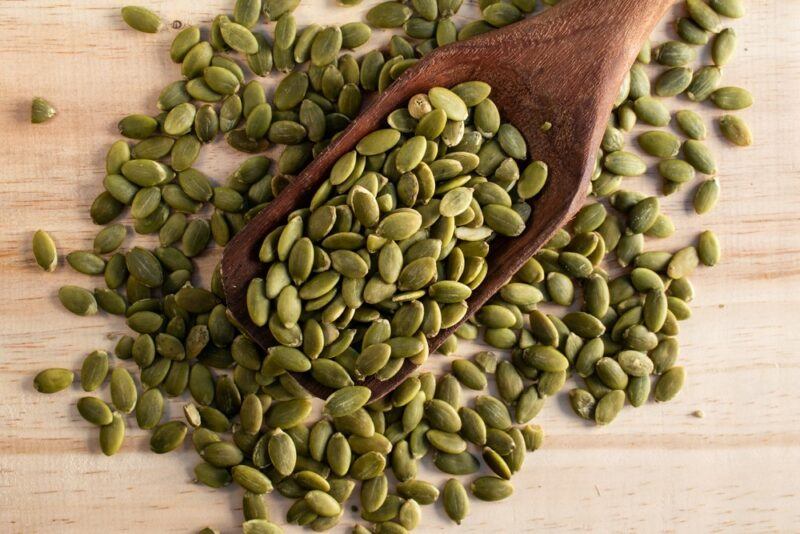
They’re Unprocessed
First of all, pumpkin seeds are a natural snack and have been through minimal processing. This is a stark contrast to foods like candy bars. Those have often been so heavily processed and rely on so many additives that they don’t look or taste like real food anymore.
You can even get pumpkin seeds from pumpkins yourself, then roast and season them. What could be more natural than that?
Honestly, with so many processed foods out there, having natural options is incredibly appealing.
Good Source Of Nutrients
The nutrients are one of the most prominent features of pumpkin seeds. Phosphorous, manganese, and magnesium are all significant here. You get a third of your daily requirements, if not more, from a single ounce of the seeds.
That’s not all. Pumpkin seeds also provide a decent amount of iron, copper, and zinc, along with vitamin K, vitamin B2, and folate.
These nutrients are all essential and are linked to a host of health benefits. Getting so many of them in a small seed is simply amazing.
A Convenient Source Of Protein And Fiber
There’s the protein and fiber to think about too. Protein is essential for your muscles and in many other places throughout your body. It’s filling too, which helps to make pumpkin seeds into a very satisfying snack.
Fiber is crucial for digestion. It also helps to maintain healthy levels of sugar and cholesterol in our blood.
There are plenty of other places to find fiber and protein, of course. Still, pumpkin seeds stand out because they’re so convenient – and you get a lot of benefits in a tiny serving.
Might Promote Prostate Health
Pumpkin seed oil and even pumpkin seeds themselves are sometimes used as a home remedy for prostate problems. Their usefulness is partly because they contain chemicals that have a slight diuretic effect, which increases urination.
As counterintuitive as it sounds, going to the bathroom more often can help with prostate and urinary issues, as doing so helps to clear irritation and reduce discomfort.
Anti-inflammatory compounds in pumpkin seeds may also reduce swelling in the prostate. However, this effect has mostly been found for pumpkin seed oil, rather than pumpkin seeds themselves.
Still, the seeds are easy enough to add to your diet, so why not try them for yourself?
Provides Antioxidants
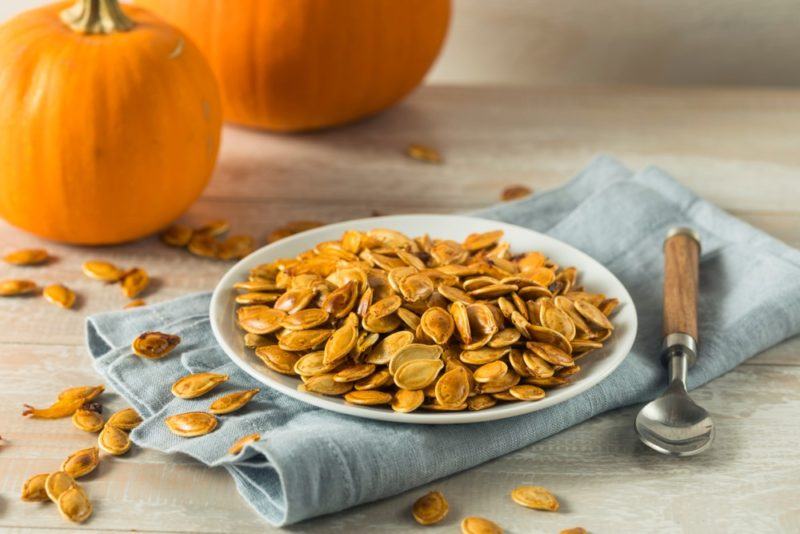
Pumpkin seeds mightn’t be brightly colored like blueberries or cranberries, but they are still packed with antioxidants.
These healthy compounds help to protect against free radical damage. By doing so, they help to lower inflammation and decrease disease risk.
With pumpkin seeds, you’re getting lots of nutrients and antioxidants, in an easy-to-eat snack that’s delicious and low in sugar. How’s that for powerful?
May Help With Heart Health
Pumpkin seeds may be exceptionally good for your heart – for multiple reasons. The antioxidants play a critical role here, as do all of the nutrients. Even the fatty acids in pumpkin seeds help.
Another factor is that pumpkin seeds increase nitrogen oxide generation. While this sounds like a bad thing, it can actually be helpful, by improving blood flow and expanding your blood vessels.
Can Lower Blood Sugar Levels
Blood sugar lowering effects have been seen for pumpkin juice, pumpkin seeds, and pumpkin itself. Magnesium may be a key reason for this effect, although other features could be relevant as well.
Foods that lower blood sugar are important for anyone with diabetes. Just be cautious if you’re taking any type of blood sugar lowering medication – as you don’t want to drop your blood sugar down too much.
Might Promote Weight Loss
Pumpkin seeds are a little contradictory, as they contain a decent amount of fat and calories yet are generally seen as healthy. The seeds can even help you to lose weight.
This apparent contradiction comes from the fact that fat and calories alone don’t define whether something is healthy or not. There’s much more to think about than just that, including the other macronutrients, along with vitamins, minerals, and antioxidants.
In the case of pumpkin seeds, you have a nutrient dense seed that’s a decent source of protein and fiber – and is satisfying. This means that a handful of the seeds makes an excellent snack, one that helps to knock the edge off any sugar cravings.
Some people find the seeds perfect in the evening when they need a little something extra to tide them over.
The Problems With Pumpkin Seeds
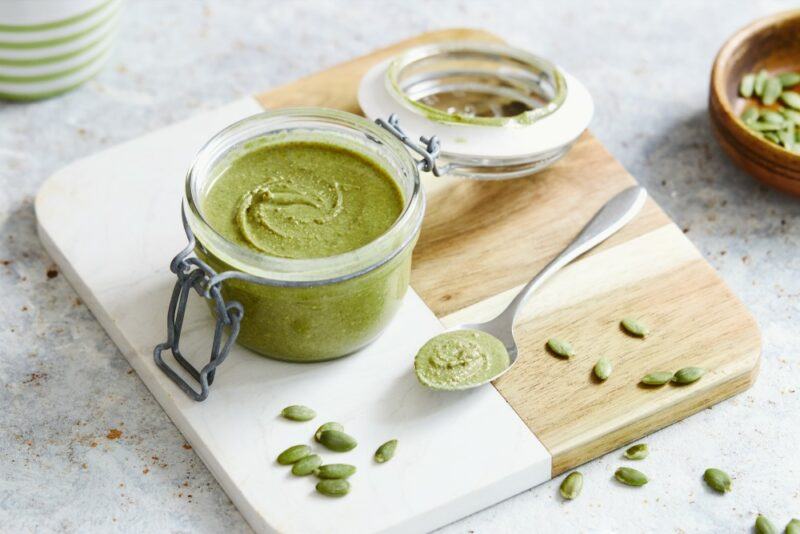
Can Cause Side Effects
While pumpkin seeds often seem benign, some people experience significant side effects, including gas, bloating, and constipation. These issues are mostly due to the fiber content, as too much fiber has funny effects on your digestive system.
However, side effects don’t always mean that you’re consuming too much fiber.
They often happen because your fiber intake has changed suddenly. People that go from a low fiber diet to a high fiber often find this, as it takes the body a while to adjust to the extra fiber.
A similar effect may occur if you suddenly increase the fat content of your diet (pumpkin seeds do contain a decent amount of fat). These types of side effects aren’t serious and should naturally decrease over time.
To make things easier for yourself, try starting off slowly and watching your portion sizes. Try not to have more than a handful of pumpkin seeds per serving.
They’re High In Fat And Calories
Most seeds and nuts are high calorie foods. Pumpkin seeds are no exception. You end up with 163 calories and almost 14 grams of fat from a single ounce of roasted pumpkin seeds.
This equates to roughly quarter a cup of pumpkin seeds and is probably as much as you should be consuming at a time.
The calorie content isn’t unreasonable when you think about all the nutrients you get from a serving of pumpkin seeds. Even so, it is something to be wary of. After all, it’s easy to overdo it with seeds and nuts, especially when they’re salted.
You Might Consume Too Much Sodium
Sodium is another area to think about. High sodium intake can lead to many issues, like high blood pressure, heart disease, kidney disease, headaches, osteoporosis, and more.
Modern diets also happen to be incredibly salt heavy. Seriously. Look at the nutritional labels of processed foods. The sodium content is often shocking.
While pumpkin seeds are often healthier than processed foods, their sodium content isn’t necessarily any lower.
Thankfully, pumpkin seeds don’t naturally contain much sodium. The sodium is added in the form of salt instead. You can avoid this by looking for raw unsalted pumpkin seeds. These will still give you all the benefits you’re looking for, without the high sodium content.
Their Omega 6 Content
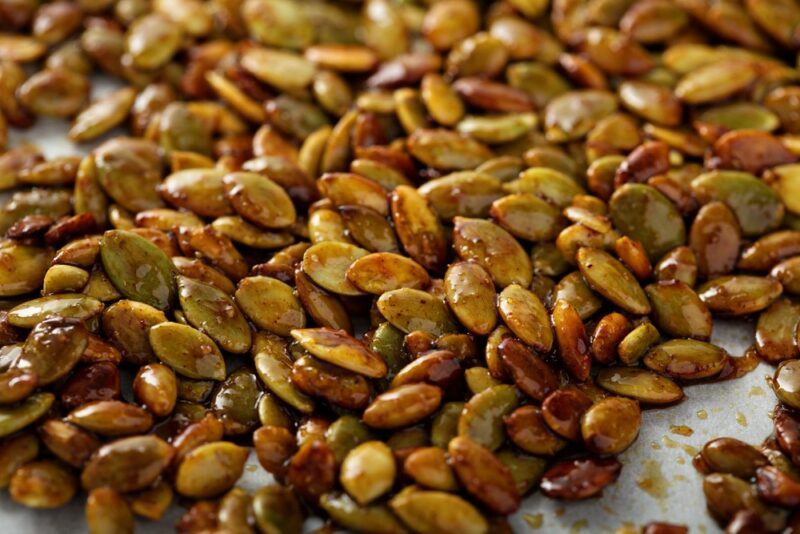
Omega 6 fatty acids mightn’t be as famous as omega 3s, but both types are important for health. If you need to boost your omega 6 intake, then pumpkin seeds are an excellent choice. You end up with around 6 grams of omega 6 per ounce of pumpkin seeds.
Yet, as healthy as the fatty acid can be, high omega 6 content isn’t always a good thing.
This is because we need a certain ratio of omega 3 to omega 6 to do well. Too much omega 6 and not enough omega 3 can lead to inflammation, which can then increase the risk of various diseases.
To make matters worse, omega 6 is incredibly common in modern diets. You may be getting plenty of it from ingredients like vegetable oil, along with all the processed foods that use this as an ingredient. Many of us aren’t getting as much omega 3 as we should be either.
To promote health, we generally need to cut down our omega 6 intake and increase omega 3s.
This doesn’t mean you need to avoid pumpkin seeds. There are plenty of less healthy sources of omega 6 that you can cut out first, including fried foods.
Still, this omega 6 content could be a reason to keep your portions of pumpkin seeds small.
Phytic Acid Content
Pumpkin seeds also contain a compound called phytic acid. This is found in many different seeds, legumes, grains, and nuts – and is considered an antinutrient.
Antinutrients are somewhat concerning, as they bind to some minerals. By doing so, they decrease our ability to absorb them. As such, antinutrients can mean that we get fewer nutrients from our food.
It’s not all bad news though. Soaking or sprouting pumpkin seeds can decrease the phytic acid content, providing you with more nutrients from your seeds.
Besides, antinutrients aren’t as bad as they seem. While these compounds can decrease your nutrient absorption, you’re still getting far more nutrients from pumpkin seeds than you lose.
Should You Eat Pumpkin Seed Shells?
While the shells of pumpkin seeds are often ignored, you can eat them if you want to. Doing so increases your fiber intake, while providing you with some extra nutrients as well.
The shells also provide a distinctive crunch, one that acts as an excellent contrast in many meals.
However, you do need to be careful when doing eating whole pumpkin seeds, as the shells are chewy and can sometimes become sharp. It’s surprisingly easy to cut yourself when eating pumpkin seeds. To avoid this, focus on hulled versions instead.
The shells may be a problem for some people too, including anyone sensitive to fiber. You may need to avoid them entirely if you have any type of digestive issue, like inflammatory bowel disease.
Interesting Ways To Use Pumpkin Seeds
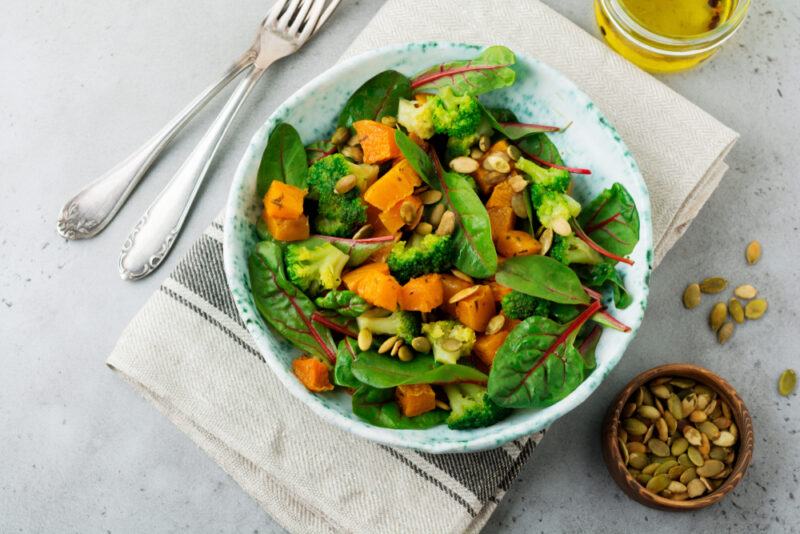
The simplest approach is to eat pumpkin seeds on their own as a snack. You might also use them as a trail mix ingredient or perhaps as part of your granola. However, there are countless other uses as well, such as:
- Blending pumpkin seeds into a smoothie
- Making pumpkin seed butter
- Mixing the seeds in with a stir fry or a noodle dish
- Sprinkling the seeds on top of avocado toast, oatmeal, soup, or another dish
- Using the seeds on top of baking, like bread or perhaps muffins
- Blended with other ingredients to make some type of dip
- Crushed to create a crunchy gluten free coating for fish and meat
Is Pumpkin Seed Butter Healthy?
Pumpkin seed butter isn’t nearly as popular as peanut butter or almond butter. That’s a shame, as it’s a useful ingredient.
The butter itself is exactly what you would expect. It’s typically made from blending roasted pumpkin seeds. A little oil can help give you the texture that you want, while some salt adds to the flavor. That’s it though for the basic recipe.
Not surprisingly, pumpkin seed butter tastes like pumpkin seeds and has the same nutritional profile. This gives it similar positive and negative features.
Is it healthy? That really depends on how you define healthy. Like pumpkin seeds themselves, the butter is high in calories and it’s easy to eat too much at a time. Still, you’re getting plenty of nutrients and healthy fats at the same time.
How Many Pumpkin Seeds Should You Consume?
Most recommendations suggest having no more than an ounce of pumpkin seeds per day. This is roughly a quarter cup of the seeds and should easily be enough for a snack.
Sticking to an ounce of the seeds provides you with plenty of nutrients, without the fat or calorie content getting too high.
However, this doesn’t mean that you can have an ounce of pumpkin seeds, one of almonds, one of walnuts, and so on. Most people will need to stick to an ounce of nuts and seeds per day – regardless of the type.
Final Thoughts
Nuts and seeds are now well-recognized as being healthy. They’re also delicious and an easy way to boost your nutrient intake.
But, as we’ve seen in this post, there are some serious issues too.
Most of these problems relate to how many pumpkin seeds you consume. So, if you keep your portions at no more than an ounce and start slowly, you should be able to get all the benefits of the seeds and avoid the risks.
Related Content
- Related: Are Hemp Seeds Good For You?
Frequently Asked Questions
Are Pumpkin Seeds Keto?
Pumpkin seeds are popular on keto, as a quarter of a cup serving gives you just under 5 net grams of carbs. You get a decent amount of fat and protein in this serving too, along with some fiber and nutrients.
Can You Eat Raw Pumpkin Seeds?
Yes. Pumpkin seeds can be eaten raw and some people do this regularly. However, raw pumpkin seeds aren’t necessarily healthier.
They contain more of a chemical called phytic acid, which is an antinutrient. Phytic acid doesn’t suddenly make pumpkin seeds bad for you, but it may decrease how many nutrients you absorb from the seeds. So, it may be better to roast pumpkin seeds (roasted pumpkin seeds are often tastier anyway).
Are Pepitas Pumpkin Seeds?
Pepitas and pumpkin seeds are similar and the words are often used interchangeably. However, the Spanish term, pepitas, only refers to shell-less pumpkin seeds from a few types of pumpkin (including oilseed pumpkins).
This means that all pepitas are pumpkin seeds, but not all pumpkin seeds are pepitas.
How Long Do Pumpkin Seeds Last?
Pumpkin seeds are best stored in a cool and dry environment, one that’s not in direct sunlight. Keeping them in a sealed container helps too, as this limits the exposure to oxygen. If you follow these approaches, then an opened packet of pumpkin seeds should last 2 to 3 months at room temperature.
If you keep your seeds in the fridge instead, then they should last 6 to 9 months. This is more than enough time to enjoy them.
Are Pumpkin Seeds Low FODMAP?
A low FODMAP serving of pumpkin seeds is 2 tablespoons, which is enough seeds for a snack or for many recipes. Going higher than this could be problematic if you have IBS, as pumpkin seeds contain the FODMAP fructan.

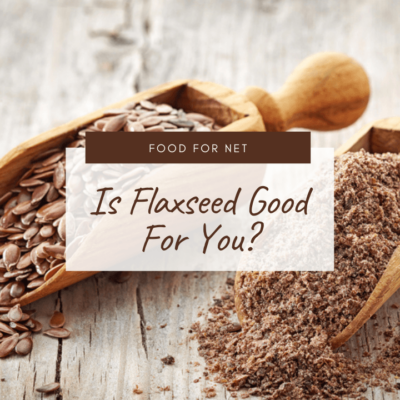
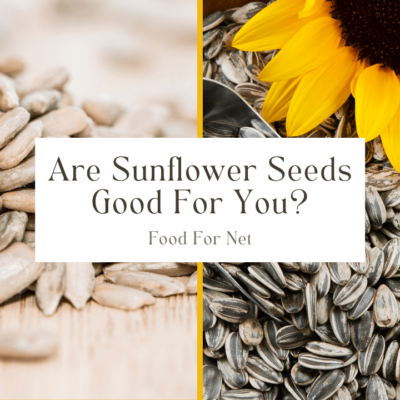

 10 Types of Low Purine Foods Plus Tips on How to Keep Your Uric Acid in Check
10 Types of Low Purine Foods Plus Tips on How to Keep Your Uric Acid in Check
I’m interested in trying fresh Breadfruit, do you deliver to the 19119 zip code, (Philadelphia, PA)?